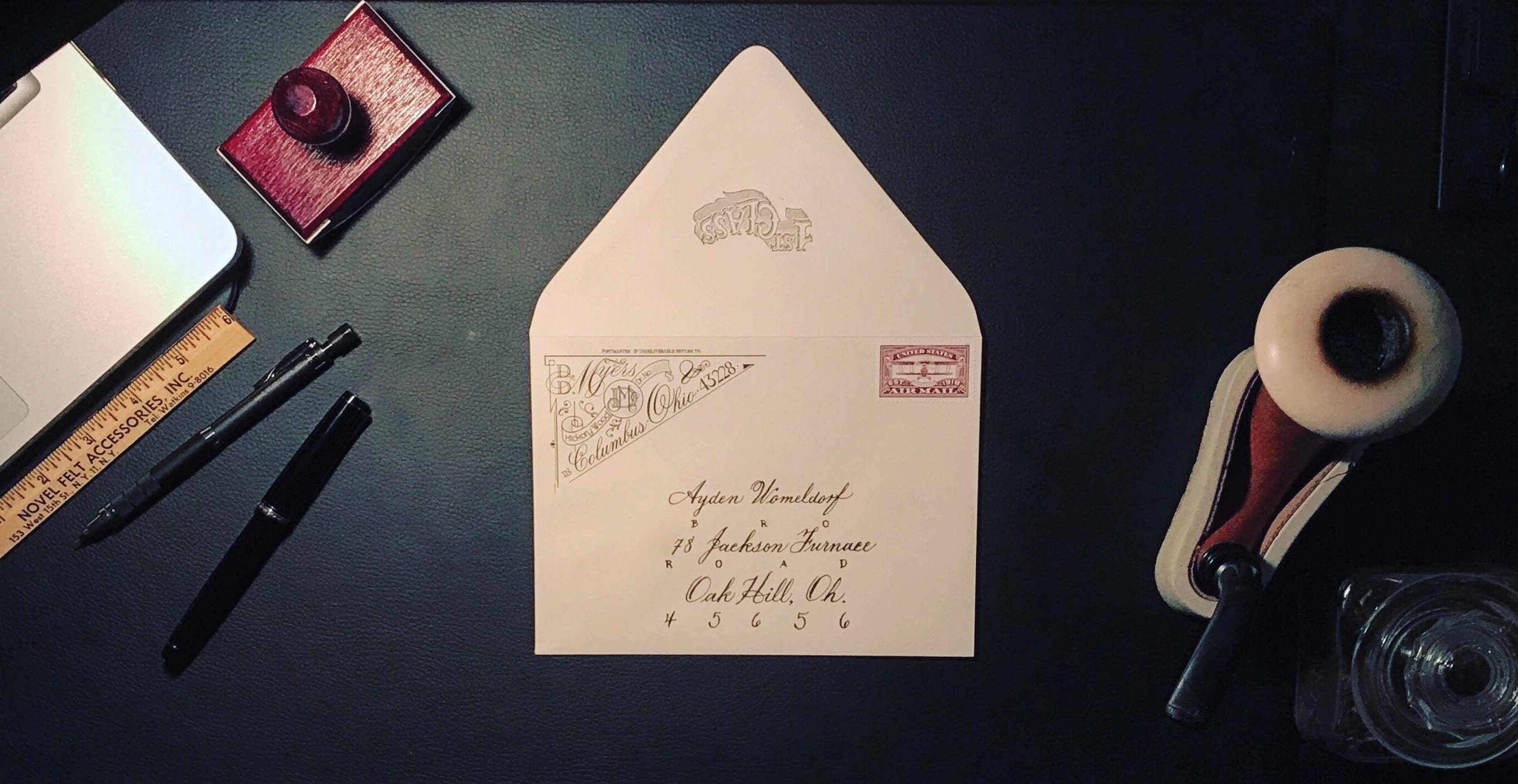Introduction by Daniel D. Myers, President, Blackwater & Sons:
"From old birthday cards stripped of their monetary contents, to high school love notes scribbled onto a torn-out piece of notebook paper – accidentally stumbling onto old mementos almost always provides a good bit of thought-provoking entertainment. These vestiges of our past allow us to relive times gone by in a way that a photograph or typed blog entry cannot. Behind and inside the color of ink and the formed shape of our words on paper, handwriting exposes our unique personalities and idiosyncrasies in a way that no other medium is capable of. It has long been theorized that the way a person writes reveals much about their character, but our handwriting may even be detrimental to strengthening our mind and body. It may also reveal where we are in life, offering a unique form of reflection. Tragically, we may be the one of the last generations to experience the profundity that comes with this simple use of pen and paper. Pens and pencils have been replaced with the keyboard and touchscreen, and recent studies indicate that this may be damning to far more than the quality of our mementos. These studies reveal that the practice of written script actually benefits our minds and bodies in a way that the keyboard cannot, and to abandon it is to neglect our own dexterity and cerebral development.
Please join me in welcoming Andrea Rall, blog contributor and our General Manager, as she explains in her first Blackwater blog post just why handwriting still matters to all of us."

“The proper definition of a man is an animal that writes letters.” –Lewis Carroll
The art of penmanship has been all but forgotten in the modern age. Nearly all individuals, governments, and businesses alike have abandoned handwritten correspondence and replaced it with hastily typed-out, electronic forms of communication that lack not only artistic value and emotion, but also personality and a sense of human connection.
Here at Blackwater & Sons, we strive to correspond by hand as much as possible – presumably in attempt to return to the simple pleasures of a time gone by, and to inspire others to do the same. As admirers of antiquity and artistic endeavors, we have collected a heap of old letterheads and billheads, all hand-scribed or typewritten, which inspire our plight to stick to the tried and true methods. We can only hope that one day – many years from now – someone will gaze upon our company letterhead or billhead, and will perhaps even be inspired to learn cursive or dive into the wonderful world of fountain pens.
We fear, however, that this downward trajectory of handwriting will one day not only leave our societies devoid of an important form of individual expression, but will also leave them unable to understand and appreciate their own cultural and ancestral origins. Imagine a future full of children who see nothing more than heiroglyphs as they pass the Bill of Rights on a classroom field trip to Washington D.C.; imagine a society full of adults who throw away boxes full of family records they found in the attic because they recognized it as nothing more than heaps of papers that have been scribbled on. Most modern school curriculums have already pulled the plug on requiring young pupils to learn cursive, and a majority of highschool and college students already take their lecture notes on laptop computers. Texting has become the primary form of communication. The desperate phone-grab and mindless screen-stare have all but replaced the courteous "hello" that we once provided verbally to passing strangers. We find this societal/technological shift both alarming and disheartening, and we have taken it upon ourselves to remind you of the many reasons why handwriting still matters.
- Your handwriting is unique. One of our favorite things about antiques is their individuality, their perfect imperfections. From scratch to scrape, each and every inch of each and every one of these items tells a story – and one's handwriting is no different. Graphologists, or handwriting psychologists, have spent years studying the way we dot our I’s and cross our T’s. Empirical research has repeatedly provided support for the notion that the many idiosyncrasies found in every person's handwriting offers unique insight to our subjective, inborn personalities. For example, rounded letters are indicative of a person that tends to be more creative and artistic, and wide ‘l’ loops are characteristic of a more relaxed and spontaneous person. Conversely, pointed letters signify that a writer tends to be more aggressive and curious, and narrow ‘l’ loops denote a writer that feels restricted and may be experiencing higher levels of tension (National Pen). When many of these indicators are present in a person’s penmanship, a startlingly accurate interpretation of the writer’s character, personality, and abilities can often be determined. Graphologists can even tell you what mood grandma was in when she wrote out her recipe for those scrumptious homemade noodles!
- Handwriting is personal. A few weeks ago I received a letter from a very close friend, and I was thrilled to find it in the mailbox! However, I quickly grew disheartened as I discovered that the letter was typed up and printed out. Don't get me wrong, any letter is better than no letter, and my friend's message was received and understood clearly. I appreciated the effort they put into drafting a message just for me and sending it in the mail with a stamp. Yet, I still felt just as disconnected from my friend as I would have if I had received a text or an email from them. Letters are intended to be personal and sincere. When I receive a handwritten letter (even if the sender has "bad" handwriting), there is just something so special about holding the very paper they sat down in front of and used to devote a moment of their time to send me a message. A recipient may be holding nothing more than a piece of paper with ink on it, but its as if one is simultaneously experiencing the very presence of the sender. Maybe it's in the color of ink they used in their pen, or in their distinct scent that has become interwoven with the fibers; perhaps its their wide, rounded loops or the sharp, forward-leaning slant of their handwritten words. A letter captures a moment in time, and in doing so, it encapsules a small trace of its maker – and that is something you can cherish even long after they are gone.
- Handwriting develops many cognitive functions. Learning how to write by hand at an early age encourages the development of both the temporal and parietal lobes of the brain, and the benefits don't stop there. Understanding and interacting with the written word (by transforming a thought or a heard phrase into one's own symbolic representation of it – or handwriting) has been shown to facilitate better reading comprehension and memory encoding than any other form of word interaction. Karin James, a psychology professor at Indiana University, conducted an experiment to demonstrate the positive effects associated with learning how to write by hand, and specifically focused on the benefits of writing in cursive. According to Kyle Stokes of Indiana Public Media, who wrote about James’ research, brain scans of the participants who wrote in cursive showed significant spikes in the activity of their brain’s reading neural network compared with the participants who only typed (Stokes). This correlation indicates that individuals who learn how to write in cursive are simultaneously engaged in developing their reading comprehension skills. In other words, individuals who develop skill in cursive writing ultimately read faster and are more likely to understand and retain what they are reading than those who don't.
We must encourage our young people and educators to value and respect the authenticity of what a pen and paper can do. We should admire their strange curves and odd lettering and allow these things to inspire creativity and artistry. Handwriting – especially in its most intricately beautiful forms, such as that of our beloved Spencerian script – may take time to master, but I can promise you that only good can come from the act of trying. Nobody was ever harmed as a result of attempting self-improvement, and you only have skill, compliments, and improved cognitive functioning to gain. You have the gift of a twenty-six letter alphabet that can be entirely your own.
All you have to do is pick up the pen.


